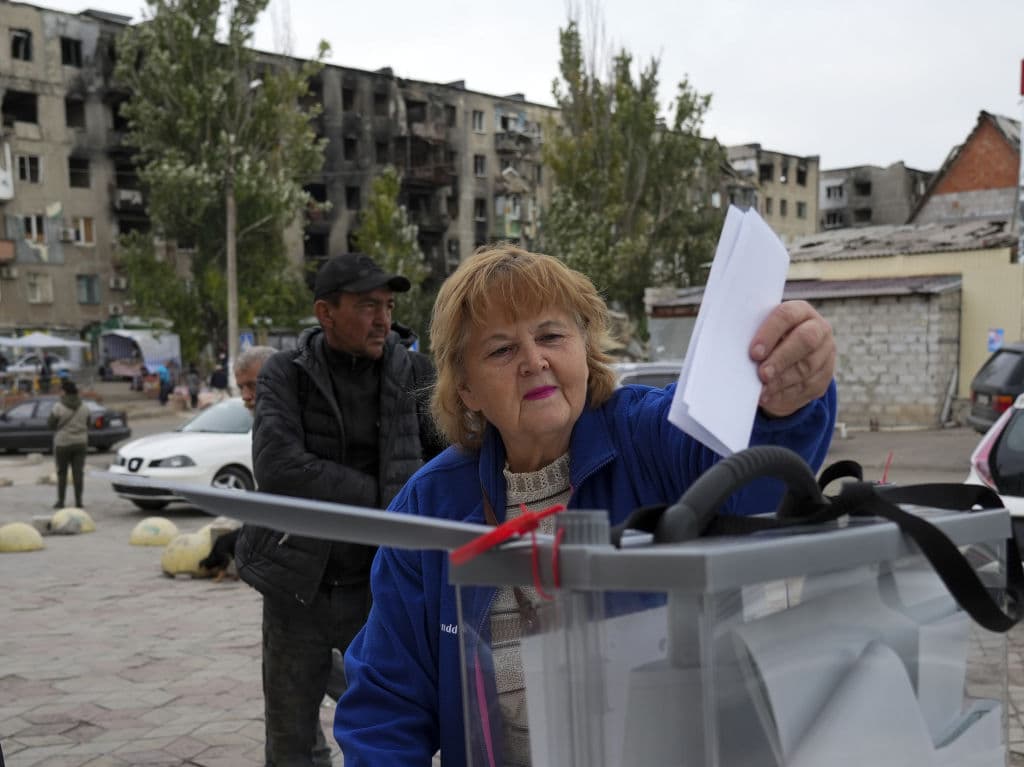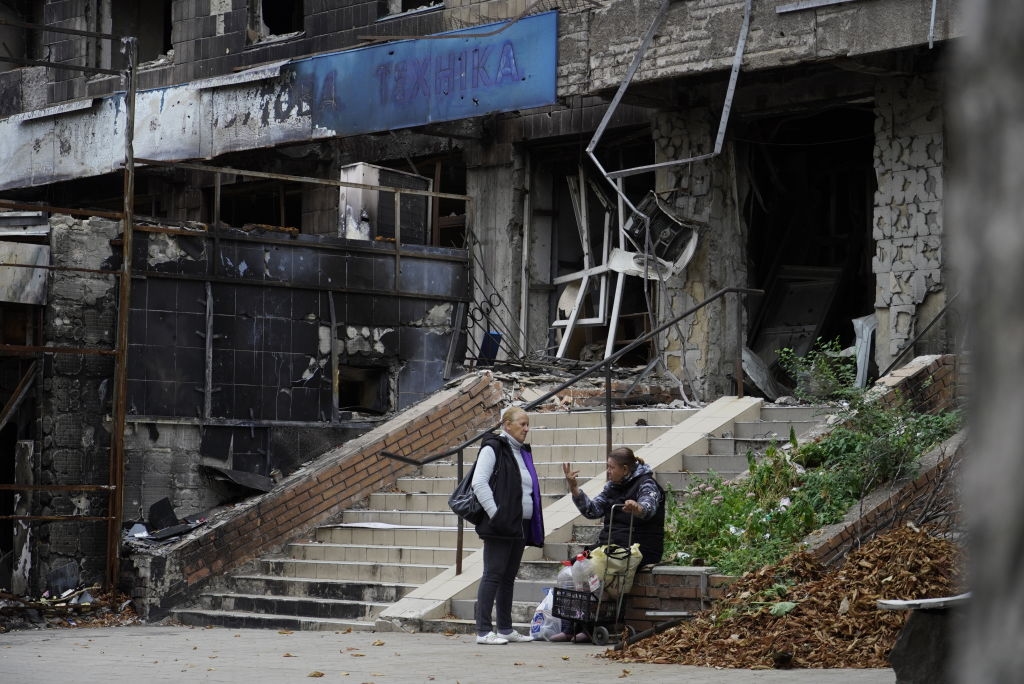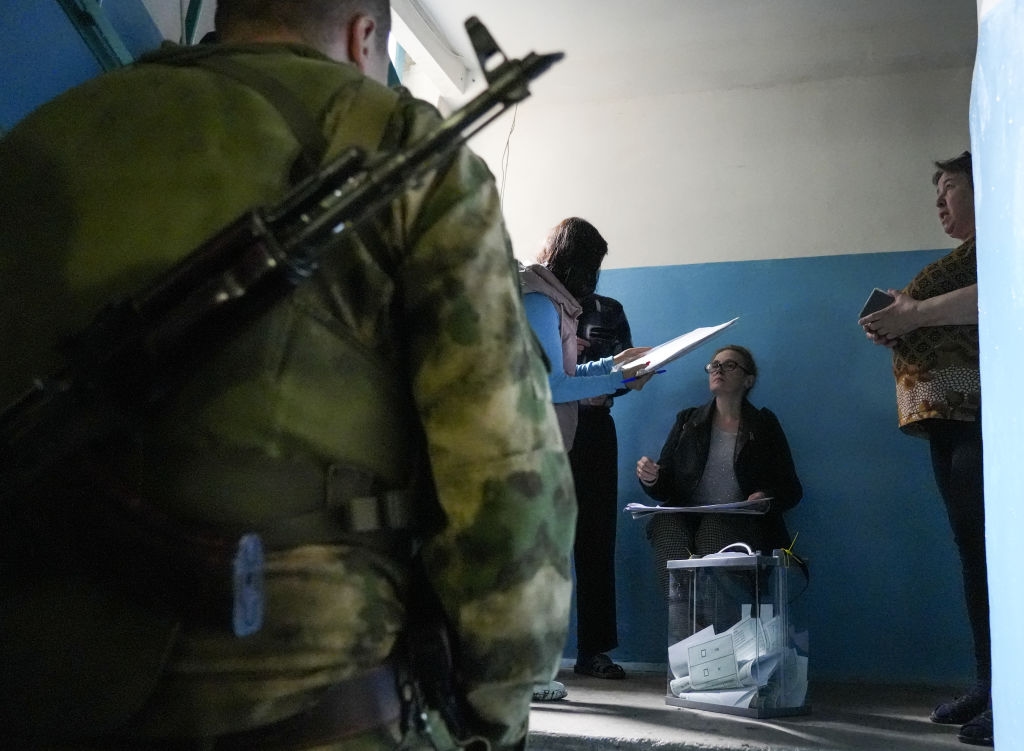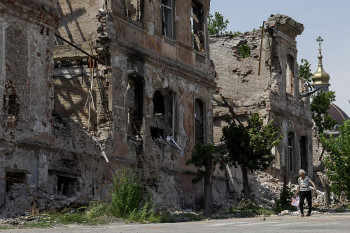Life under occupation: 'I was forced to vote in sham referendum at gunpoint'

Editor's Note: This story includes interviews with people living under the Russian occupation. Their names have been changed to protect their identity as they have shared sensitive information that could place them and their families in danger.
Mariupol resident Oleksandr, 53, had just entered a hardware store when Russian soldiers suddenly came up to him and took him outside.
They were holding rifles. The soldiers asked if Oleksandr wanted to vote, and he said "no." But they took him to the nearest "polling station" anyway, forcing him to participate in the sham annexation "votes."
The Russian soldiers weren't precisely dragging him by force, but "they made it clear that it's worth going and voting to join Russia," Oleksandr said. "They claimed if we vote 'yes,' we can live peacefully and prosperously."
Time was ticking, and he had to quickly decide whether to vote "yes," to play it safe, or "no." He wasn't going to vote, so he didn't have the time to play out the situation in his head.
"I voted against (joining Russia) because I was born and raised in Ukraine, and my children were also born in Ukraine," Oleksandr told the Kyiv Independent.
Oleksandr's native Mariupol, Donetsk Oblast, was captured by Russia in May after enduring a brutal months-long siege, where tens of thousands are believed to have been killed. Satellite images have shown mass graves near the city, and living conditions remain dire.
Every part of the city used to be full of memories with his family, who fled Mariupol in April. He decided against going with them because he has a disability, and it would be difficult for him to evacuate from Mariupol amid incessant shelling.
"I had a good life, and I had everything for a comfortable life before the plane flew in and destroyed my apartment with one blow," Oleksandr said, describing the days of the siege.
Sham referendums
Months into the occupation, Russian proxies have staged "referendums" in four Moscow-held territories in Ukraine's eastern and southern regions, with Donetsk Oblast among them.
Russian President Vladimir Putin formally claimed annexation of Ukraine's occupied regions on Sept. 30. Russia controlled the count and claimed nearly 100% support among voters.
Russia doesn't control the regions it claims to annex in full. Russia currently occupies around 60% of Donetsk Oblast. Residents in occupied territories were forced to vote at gunpoint.
Some residents were given food and water in exchange for a "vote," the city council said. In some occupied regions, military-age men who refused to vote were threatened to be mobilized, according to Ukrainian officials.
Between Sept. 23-27, when the Kremlin held sham referendums across occupied territories, Oleksandr was trying to make something of his severely destroyed apartment. He went to the hardware store to buy equipment when the soldiers caught him.
The apartment, which he renovated for many years with his now deceased parents, was supposed to be something he could have passed on to his children, Oleksandr said.
"Now I don't have anything," Oleksandr said.
Oleksandr is also going through financial difficulties as food prices spiked under Russians. With half of his leg missing, he physically can't work, he said.

Living in isolation
In Kherson, another major southern city occupied by Russia, there was barely anyone outside a day after Moscow claimed victory in its illegal annexation votes that also took part in the city.
"I did not hear a single word about the 'referendum' and its results," Pavlo, 54, told the Kyiv Independent. "It was as if it just passed, and no one paid attention to it."
Afraid of encountering Russian soldiers outside, Pavlo barely left the house for nearly a week. He only left the apartment twice – to buy vegetables, bread, and cat food. To avoid direct encounters with Russian soldiers, he avoided crowded places and using quiet streets with fewer people.
"I got the impression that the city froze, (everyone) hid," Ivan said. "People tried not to stay long outside, hurried home."
Pavlo lives a solitary life in occupied Kherson after his wife and son-in-law had fled to Ukrainian-controlled territory. He lost his job in the IT sector, but his previous workplace, which relocated to Ukrainian-held territory, still supports him financially, just enough to get by.
Alone at home, Pavlo spent a lot of time reading and canning vegetables in preparation for winter.
Ever since Russians occupied Kherson in early March, people are "less cheerful (and have) closed themselves off," he said. He is also very careful about what he says in public, especially during the "voting," which he calls a "circus set up" to entertain the Russian public.
"Repressions and terror to the civilian population will continue (in the city)," Pavlo said.
Pavlo admitted that he thinks about fleeing "all the time," but he has chosen to stay behind for now. He is also reluctant to leave his home.
"Kherson was, is, and will be Ukraine," he said. "There is no doubt" that Ukraine will liberate Kherson one day, he added.

Hiding from mobilization
In Alchevsk, Luhansk Oblast, occupied by Russia since 2014, 31-year-old Danylo is forced to stay home, afraid he would be mobilized into the Russian army.
Danylo saw how other men were being taken to the conscription office en masse.
"I always sit at home. I don't go out anywhere," Danylo told the Kyiv Independent.
As far as he knows from his wife, who buys groceries for the household, Alchevsk hasn't changed during the "referendum." Despite Russians boasting about a high turnout, the city is empty.
It's always been quiet, but more Russian soldiers have arrived over the past months, he said.
Danylo says none of it was "scary" because it's been a long the since Russians have seized control of the city, and he is reluctant to leave because it's his home and his relatives have also stayed behind.
He used to do construction work periodically, but he says he can't leave home now until "everything is over."
But any "results" announced from the sham referendum or annexation won't change anything, he said. The international community has dismissed the vote as "a propaganda show."
"Nothing will change, people live their lives here," Danylo said.











